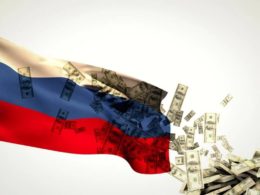On 15 June 2023, a bipartisan group of US senators introduced a draft act known as the Rebuilding Economic Prosperity and Opportunity for Ukrainians Act (REPO), which significantly expands the possibility of confiscating Russian assets and their transfer in favor of Ukraine. This act, if passed, would provide additional assistance to Ukraine at the expense of assets confiscated from the Central Bank of the Russian Federation and other sovereign assets of Russia. The REPO act also calls for increased coordination between the US and its allies for similar confiscation of Russian sovereign assets in other countries.
The authors stressed that the legislation would allow the US to use over $300 billion in frozen Russian assets to support Ukraine's rebuilding efforts. Senator Jim Risch, a coauthor of the bill, noted, "Given Russia’s brutality and continued war crimes against the Ukrainian people, it is only right that Russian government funds in the United States be seized and repurposed to help Ukraine rebuild its country."
The REPO Act would not only hold Russia financially responsible for the devastation caused by its unprovoked invasion but also serve as a deterrent to other potential aggressors, Representative McCaul underscored. He stated, "Congress must act to prohibit the administration from trading away Russian state assets before they can be used to compensate Ukraine."
According to the legislation, the Act will give the US President the power to confiscate and transfer frozen Russian assets to assist Ukraine's reconstruction. It will also mandate that no funds be released to sanctioned Russian entities until Russia withdraws from Ukraine and agrees to provide compensation for the harm it has caused.
Representative Marcy Kaptur emphasized the importance of Russia bearing the cost of rebuilding Ukraine, noting that the Act "will ensure Russia bears the cost of returning Ukraine to her full glory, while guaranteeing that the Ukrainian people can truly prosper in their hard fought Liberty."
Ukrainian President Volodymyr Zelenskyy has called this bill a significant international step, expressing his gratitude to US senators for their bipartisan support for justice for Ukraine. He emphasized the importance of making individuals who serve the ruling regime in Russia feel the loss of these assets
Pressure to seize funds from Russia's Central Bank grows
One of the most pressing challenges for Ukraine after the war with Russia is to rebuild its economy and infrastructure, which have suffered massive damage and disruption from the Russian invasion and aggression. While Ukraine has received significant financial and humanitarian assistance from its Western allies and international organizations, it still faces a huge funding gap to cover the costs of reconstruction and recovery.
Some experts and politicians have suggested that one of the possible sources of funds to rebuild Ukraine could be Russia's Central Bank, which has been involved in financing Russia's war efforts and supporting its troops on the ground.
Particularly, following the occupation of Ukraine’s Crimea and the beginning of the war in Donbas in 2014, Russia’s Central Bank accumulated money for a new war. Russian international reserves increased from $385 billion in 2014 to $630 billion in 2022.
The EU and US lack the legal framework to designate Russia as an aggressor country to automatically confiscate the assets of Russian oligarchs and, most importantly, the reserves of the Russian Central Bank. Instead, the West tries to prove that particular individuals violated sanctions or laundered money, using this argument as the reason to confiscate their particular property. In this way, the US allowed this May to seize the property of Russian oligarch Malofeyev and forfeit it to Ukraine.
According to an article in The Atlantic, Western governments froze approximately $300 billion in state assets from Russia's central bank a year ago. If these funds were seized and given to Ukraine, they could cover most of Ukraine's rebuilding costs, estimated at $400 billion. The seized funds could also cover nearly 75% of Ukraine's costs and significantly reduce the burden on potential financiers, making the country a more appealing investment destination.
However, the legality of such a seizure is debatable, as it has never been attempted before, and little precedent exists for the US to confiscate the assets of a nation with whom it isn't at war. Nonetheless, experts argue that international law offers justification for such an action, given Russia's culpability for the war.
On the other hand, there are concerns that such an action could reduce faith in the American economy and the US dollar and threaten US assets and investments in other countries.
European Union officials are also grappling with the question of using assets of Russia's Central Bank. They have confirmed the existence of assets worth over $215B billion belonging to the Russian central bank and private Russians. These assets, frozen after Russia's invasion of Ukraine, are being considered for use in Ukraine's reconstruction, as per the ongoing discussions among EU nations led by Sweden's Anders Ahnlid.
Nevertheless, many believe that the unprecedented nature of Russia's crimes, the allowances of international law, and Ukraine's growing need all point to one clear direction: Russia's frozen assets should be used for Ukraine's reconstruction.
US approves first transfer of seized Russian oligarch funds to Ukraine
Engaging headlines:
- "Bipartisan US legislators champion Ukraine's reconstruction with REPO Act"
- "REPO Act: US steps up to aid Ukraine's post-war rebuilding using frozen Russian assets"
- "Russian assets to be repurposed for Ukraine's reconstruction: US legislators propose"
- "REPO Act: US moves to make Russia pay for Ukraine's reconstruction"
- "US legislators propose new route to Ukraine's restoration: Russian assets"
- "US proposes to fund Ukraine's rebuilding using seized Russian assets"
- "Proposed REPO Act to turn Russian assets into aid for Ukraine's reconstruction"
- "US lawmakers unite to use Russian assets for rebuilding Ukraine"
- "REPO Act seeks to make Putin foot the bill for Ukraine's rebuilding"
- "US law could turn Russian assets into Ukraine's reconstruction fund"
1-Sentence Ledes:
- "US lawmakers introduced the REPO Act, legislation to utilize frozen Russian assets for the reconstruction of Ukraine."
- "Senators Risch and Whitehouse propose the REPO Act to aid Ukraine's post-war recovery with frozen Russian assets."
- "The REPO Act was unveiled by bipartisan US lawmakers, intending to use Russian funds for rebuilding war-torn Ukraine."
- "US legislators propose making Russia pay for Ukraine's reconstruction with the newly introduced REPO Act."
- "The REPO Act, aiming to transfer seized Russian assets to aid Ukraine's reconstruction, was introduced by US lawmakers."
- "Risch and Whitehouse propose using frozen Russian assets to rebuild Ukraine with the REPO Act."
- "US legislators introduced the REPO Act, targeting Russian assets for Ukraine's post-war rebuilding."
- "The REPO Act, a proposal to use Russian funds for Ukraine's reconstruction, was introduced by bipartisan US lawmakers."
- "US Senators propose the REPO Act to turn seized Russian assets into funds for rebuilding Ukraine."
- "The REPO Act, a US legislation proposed to aid Ukraine's reconstruction using Russian assets, was introduced by Senators Risch and Whitehouse."



